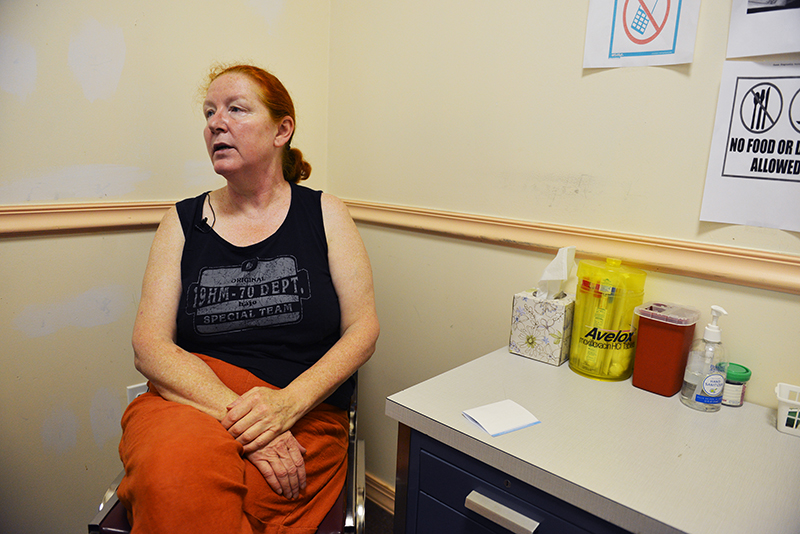

In a country without universal health care where the prices of insurance and coverage are constantly on the rise, it’s getting hard to be someone living uninsured. In Philadelphia, 15 percent of adults go without health insurance according to the Pew Charitable Trusts. Many don’t get care until it’s urgent and then use the ER as their hospital. There aren’t many options.
St. Catherine Laboure clinic located at 5838 Germantown Ave., however, provides care exclusively to those without health insurance for just a $15 fee. Open Monday through Thursday, the clinic provides health care, medication and counseling to hundreds of patients.
Behind a desk in the small, bright waiting room a wall of colorful folders hold the records of patients. Down the hall three examination rooms give way to offices. Upstairs is the dispensary and more offices. A small crucifix on the wall alludes to the clinic’s roots.
St. Catherine’s was founded 13 years ago when physician Sheila Davis and physician’s assistant Michelle Palos-Samsi started seeing patients at their church St. Vincent de Paul, located just blocks away from the current clinic. The two did free blood pressure screenings. A few years later, the clinic moved to the local YMCA, and found its final location in 2004.
Lindsey Palos-Samsi, the clinic’s office manager and daughter of one of the founders, said the woman St. Catherine Laboure was devoted to serving the poor providing not only health care but also emotional support. The clinic sees emotional care as an important part of what it does.
“We feel that a huge part of taking care of yourself is having a sense of responsibility for how you are living. When you suffer from depression or anxiety, it is hard to take care of yourself,” said Lindsey Palos-Samsi. She says that hat about one-third of each visit is spent counseling or other social work related conversations.

That personal connection is important to patients as well. Angela Klerna-Clark, originally from Germany during the Eastern Bloc, immediately felt comfortable in the clinic.
“The doctor who saw me was from Poland. We had a special connection. We know what each other went through,” said Klerna-Clark. She and her husband, both ceramic artists, lost their health insurance in 2010 when her husband was let go from his job at a non-profit for financial reasons. Not being insured is scary for Klerna-Clark.
“I’m 56 and my husband is 60. As we get older it’s important that we continue to get care.”
Without St. Catherine’s to turn to, Klerna-Clark would have been in trouble. Recently she found lumps in her breast and also needed a hysterectomy. The doctors at the clinic were able to see these problems and then refer her to the Einstein Women’s Health Program.
“Without this institution, I would have no way of going to the doctor,” Klerna-Clark said.
When she and her husband lost their insurance, Klerna-Clark considered moving back to Germany where there is universal healthcare for all citizens.
“For me it’s unbelievable. America is a very rich country. How can they not manage to have health insurance?” Klerna-Clark said.
Like Klerna-Clark and her husband, many of the St. Catherine’s patients are not unemployed but underemployed by a job that doesn’t provide health insurance.
“When people don’t have insurance it costs a lot, some days you realize it has nothing to do with someone’s status. People work constantly, their hours are crazy because they have close to full-time jobs and they can’t do anything about that.” Explained volunteer Ayreece Rearden. “People just fall on hard times. They might have had insurance last year but this year they don’t. It doesn’t mean that they can’t keep up with their illness.”

While a lot of St. Catherine’s support comes from grants and donations, they also rely on a crew of volunteers. Rearden said she hopes to go back to graduate school to become a physician’s assistant herself and would rather volunteer at St. Catherine’s than get paid to work elsewhere. She said finds the clinic’s giving and caring atmosphere to be really important.
“For the life of me I’d rather be an advocate than sitting there telling people no. That’s what you get everyday– people saying, no, no, no…” St. Catherine’s also provides personal and spiritual fulfillment for Rearden.
“I’m my best when I’m serving someone else. For me to serve others, that seems like my duty, and that’s part of my faith,” Rearden said. Many volunteers are students fulfilling service hours. Adminastrative, nursing, and fundraising helers are needed. Those interested in volunteering can visit the clinic’s website for more information.


Be the first to comment